Spring Renewal

by Professor Billie J. Swalla, Director of FHL
Spring is in the air, the daffodils are blooming, and FHL is undergoing its own renewals this spring. The main lab, Fernald lab, has served FHL for over 50 years. Built in 1964 as a lab to be used in the summer only, this beloved building’s plumbing was showing its age and is being refitted for drains in the basement. The FHL office staff is temporarily in Lab 10, enjoying the views and the spacious design there, and the animals from the touch tank have been relocated to Lab 8. We are looking at a June 1 deadline to have this construction finished in time to welcome our many summer students and researchers.

We moved the ‘touch tank’ from under the stairs in the Fernald building!
by Pema Kitaeff
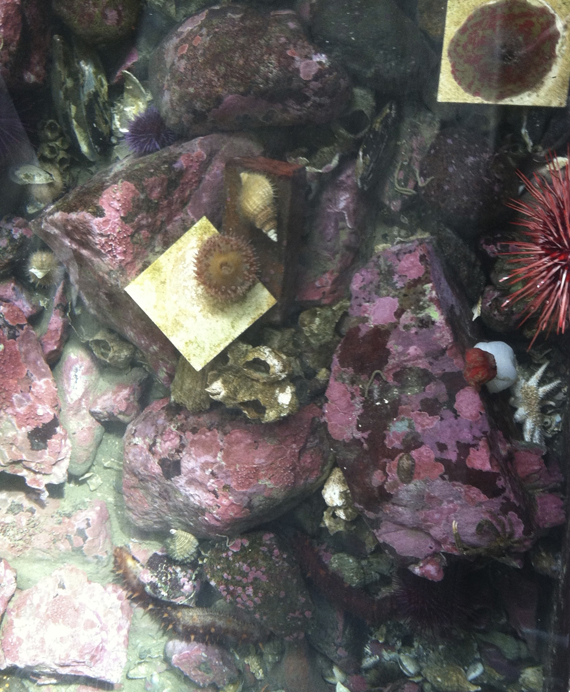
Most visitors to FHL – whether they’re here for a year or an hour – are enamored with what we often call the “touch” or “pet” tank under the stairs in Fernald. From Jan 29th - Feb 10th, in preparation for planned work on the building's lower floor, we managed to move every living anemone, chiton, and gunnel from the tank. Many thanks for this effort are due to our intrepid maintenance crew and to Katie Dobkowski, a UW grad student in residence at FHL. We used multiple buckets, two pickup trucks, and a couple coolers to move most of the pink coralline algae-covered rocks to 5 flowing seawater tables in Lab 8. Finally, a forklift was used to transport the largest boulder to a spot just below the pier's boat sign-out shed, where UW divers may visit it on occasion.

Friday Harbor High School: A Hotspot for Science, Technology, Engineering and Math
by Derek Smith

It’s an exciting time for Science, Technology, Engineering, and Math (STEM) programs in this country, and Friday Harbor High School is getting in on the action in cutting-edge fashion. Last year, the San Juan Island School District was awarded a million-dollar grant from the State of Washington to design, build, and equip a state-of-the-art STEM facility on the shared high school and middle school campus as part of their Career and Technical Education (CTE) program.

Orca Bowl 2015
Congratulations, Friday Harbor High School!
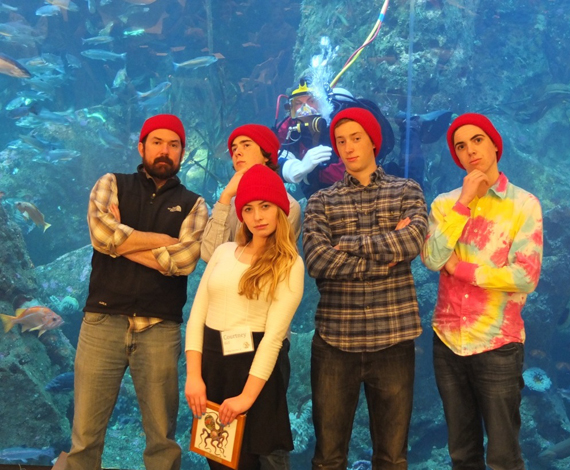
Friday Harbor High School competed and won the Orca Bowl on February 28, 2015 on the University of Washington campus. The ocean sciences competition involved 20 teams from all over Washington and was particularly intense, requiring 11 rounds of questioning. Orca Bowl is coordinated by Washington Sea Grant and the event was a great success in raising awareness of marine science. Friday Harbor has taken first place in the Orca Bowl 5 times in the past 10 years – an amazing record. We are very proud of Friday Harbor Team, who won the 2015 competition. They are moving on to the National Ocean Sciences Bowl scheduled for April 23 – 26, 2015 in Mississippi.

New Endowment: FHL ADOPT–A–STUDENT ENDOWED FUND
by Rachel Anderson, FHL Assistant Director for Advancement
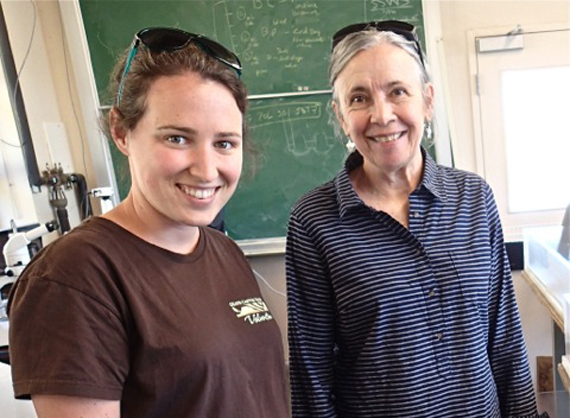
The FHL Adopt-a-Student Program changes lives. Quite simply, without this important scholarship program, many qualified students could not attend a course at Friday Harbor Labs. In addition to offering much-needed financial assistance, a delightful aspect of this program is that it presents the opportunity for students and sponsors to meet one another. Not all participants are able to take advantage of this opportunity, but those who meet are always greatly rewarded by the experience.

Professor Megan Dethier named the FHL Associate Director of Academics and the Environment
by Billie J. Swalla, Director of FHL
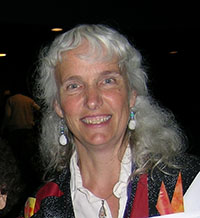
Megan Dethier is a Professor of Biology and a full-time research scientist at Friday Harbor Laboratories. She is famous for her “ZooBot” course, taught during the spring quarter to undergraduates. This course which has launched many a marine biologist’s career over the many years that Megan has taught it. Now Megan's wearing a new chapeau as the FHL Associate Director of Academics and the Environment. This title fits Megan well, as she has been contributing to the academic programs at FHL for many years and she is a champion and steward of the marine environment.

Tom Campbell
by Fred Ellis, Maintenance Supervisor

What do you get when you transplant a talented southern California carpenter to the UW Friday Harbor Labs? If he’s Tom Campbell, you get very, very, lucky.
Tom came to us six years ago from a carpentry career in the Santa Barbara area where he lived with his lovely wife Jane, built exquisite houses, grew avocados as big as cantaloupes, surfed, and played jazz piano. The move north was transformative. Avocado farming and surfing weren’t going to transplant well, and were replaced respectively by a burgeoning bed of strawberries and a sixteen-foot racy little GlassPly boat. Building grand houses got traded in for building FHL's race-track flume enclosure, the platform and stairs for the Flow Lab flume, and the flagstone patio at the Director’s house. Jazz piano survived the move intact, Tom has a perpetual twinkle in his eye, and sometimes when Jane swirls into the maintenance shop to see him, she’s walking on air.

Exploring Tetiaroa
by Professor Billie J. Swalla, Director of FHL, & Shawn Luttrell, Graduate Student
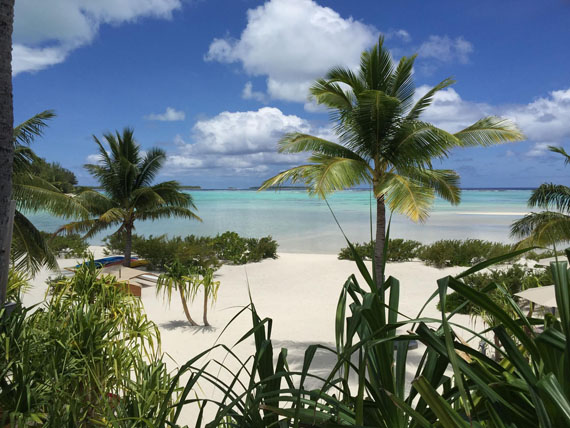
Tetiaroa, an atoll in French Polynesia, made world news when Marlon Brando purchased it in 1966 and 1967, from a descendant of Dr. Williams. The royal Pomare family of Tahiti had given the sacred island to Dr. Williams, the only dentist in Tahiti, to thank him for his services to the kingdom. I was only a child then, but remember reading about this special place in the Pacific, and how idyllic it was. Thus, I was pleased to hear that a marine station was being established there for research and teaching, and eagerly agreed to become one of the scientists working and learning from the unique location and environment. The Tetiaroa Society runs the Ecostation, a newly-established and unique marine lab on the Motu Onetahi on Tetiaroa, and I am a member of their Scientific Advisory Board. Atolls are special places; by definition they are coral reefs with small bits of land, called motus, that are usually rich in marine diversity but there is little fresh water on an atoll.

Japan/U.S. E.S. Morse Institute
by Billie J. Swalla, Director of FHL
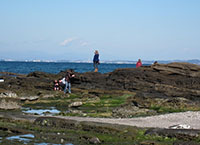
FHL has established a long-term exchange with Misaki Marine Biological Station (MMBS), facilitated by the E.S. Morse Institute and Mikimoto Pearls. MMBS was established in 1886 by the University of Toyko and is the oldest marine lab in Japan as well as one of the oldest marine labs in the world. Like all marine labs, MMBS was established at a location of high biological diversity, and facilitates marine research and education. In 1910, MMBS was expanded under the supervision of the second Director, Professor Isao Ijima, at the same time as the establishment of the Institute of Fisheries in the College of Agriculture (now the Faculty of Agriculture, University of Tokyo). From 1908 to 1912, MMBS began the cultivation of pearls, applying marine science to a lucrative business. This is how a group of E.S. Morse Scholars traveled to Japan in early March this year to participate in a short course, supported by funds from Mikimoto Pearls.

"The Sperm Whale and You,"
a YouTube Video by Ian Stevens and Zachary Bevins,
FHL Autumn 2014 Quarter students
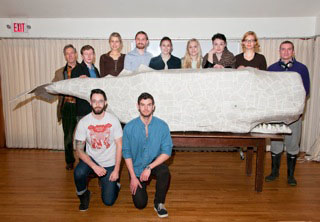
The video represents UW students, Stevens and Bevins' final project for their Marine Biology Class at FHL. To quote Richard Kenney, one of their Reading and Writing in the Marine Environment instructors:
“The Sperm Whale and You,” … is a nine-minute rigorous-not-to-mention-hilarious education on the subject of this greatest of creatures, thoroughly inspired and informed by a passionate reading of Moby Dick. The words are mostly direct quotes from Melville, glossed by Jacques Cousteau, stitched together with integumentary prose of authors Bivins and Stevens. The voice belongs to Adam Summers, a senior scientist and professor in residence at the Labs."

Coming Events
Open House
Saturday, May 16, 2015
FHL Illg Distinguished Lectureship
Professor Stefan Bengston, Swedish Museum of Natural History
July 2, 2015
Jazz at the Labs
Saturday, August 22, 2015
In the News
• UW TODAY article on the "Naturally acidic waters of Puget Sound" which surround FHL.
• PBS Newshour Coverage: Scientists Solve Mystery of West Coast Seastar Plague.




